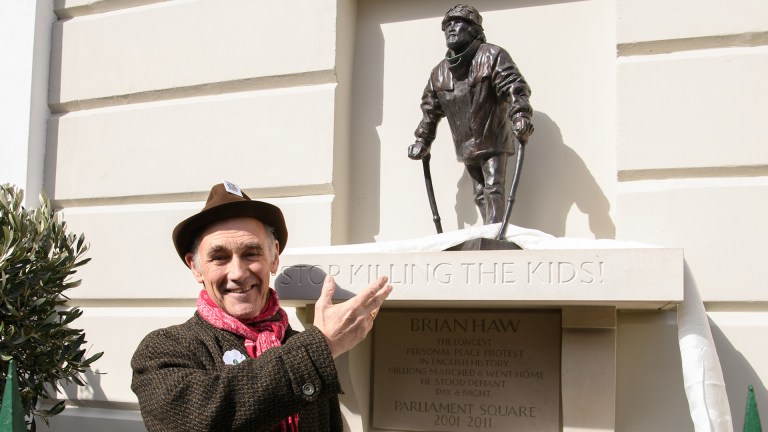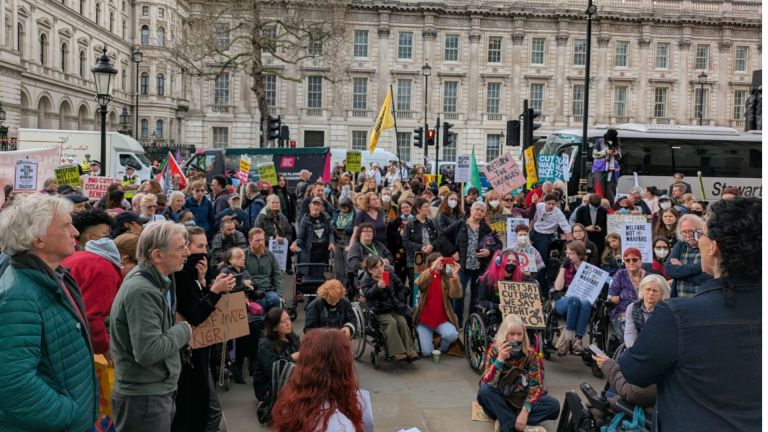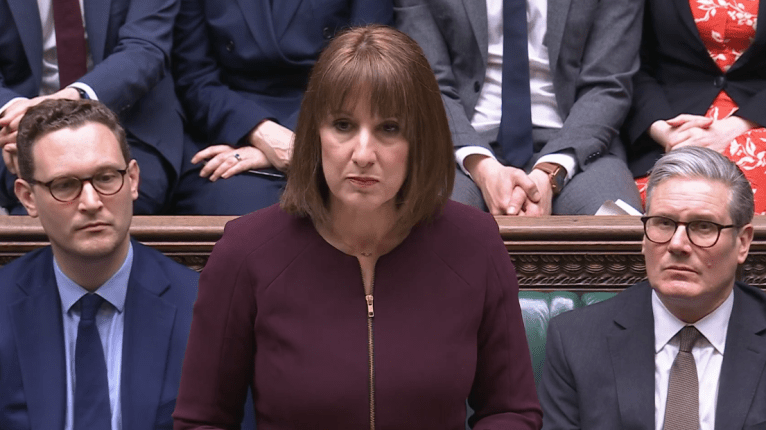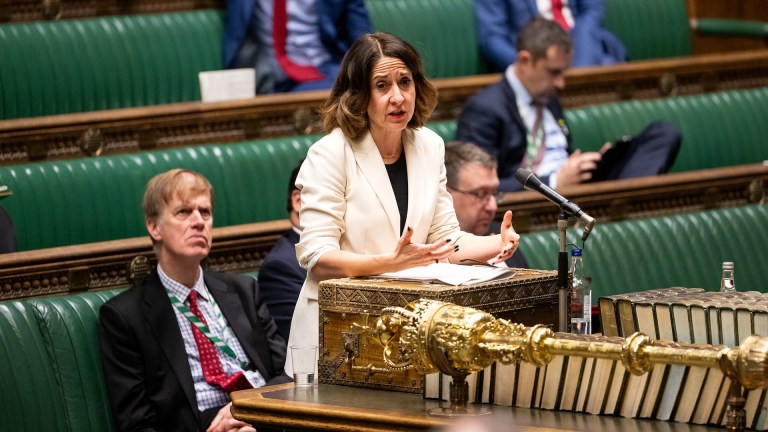Isabel Stockton, a senior research economist at the Institute for Fiscal Studies, said Reeves has “boxed herself in with promises to meet her fiscal targets, not to raise taxes further and not to return to austerity for public services, easy or risk-free options for the chancellor are in short supply”.
Here’s what we know about Rachel Reeves’ Spring Statement so far.
Cuts to government running costs
The chancellor has confirmed that she plans to cut the costs of running government by 15% by the end of the decade, with 10,000 civil service jobs expected to go. The total savings will amount to around £2 billion a year.
Reeves said on the BBC’s Sunday with Laura Kuenssberg that the “size of government increased massively during Covid”.
She said that cutting costs by 15% by the end of parliament is “more than possible” with advances in artificial intelligence (AI) and technology.
“If we can realise those benefits, it means that we can invest more in people working on the front line – whether that’s teachers in our schools, police on our streets, or doctors and nurses in our hospitals,” Reeves said.
Advertising helps fund Big Issue’s mission to end poverty
When pressed, the chancellor confirmed on Sky News that it could mean 10,000 jobs are cut, although this was not a fixed target.
PCS, the civil service’s union, has warned that “the impact of making cuts will not only disadvantage our members but the public we serve and the services they rely on”.
General secretary Fran Heathcote said: “If the last government taught us anything it’s that you can’t cut your way to growth. We’re happy to engage with the government over many issues but if they don’t talk to us about what is an arbitrary figure for cuts plucked out of the air in order to make it sound like an efficiency they will meet with a lot of opposition, not just from unions but from the public who will be affected by cuts in the services they receive.”
Will there be cuts to public services in the Spring Statement?
Government departments have reportedly been asked to model cuts of up to 11%.
Reeves has stressed that final decisions on departmental spending will not be made until the spending review, which sets departmental budgets for three years, in June.
However, it is likely that there will be some cuts set out in the Spring Statement as the chancellor scurries to make savings. The Guardian reports that Reeves is preparing to announce the biggest spending cuts since austerity.
Advertising helps fund Big Issue’s mission to end poverty
Keir Starmer confirmed that the government is looking to make savings “across the board”.
Speaking on BBC Radio 5 Live, the prime minister said: “We’re not going to alter the basics, but we are going to look across and one of the areas that we will be looking at is, can we run the government more efficiently? Can we take some money out of government?”
One department under the spotlight is the Department for Education.
The Times is reporting that universal free school meals for infants has been put on the table to be cut as part of plans to slash the Department for Education’s spending by £500m. Currently, all children in reception, year 1 and year 2 are eligible for free meals.
The Times also speculates that funding for free period products in schools could be axed, as well as dance, music and PE schemes.
However, an education official told Politico that “none of this is on the table” and that, instead, the Department for Education is making the case for these schemes to survive.
Advertising helps fund Big Issue’s mission to end poverty
£2bn investment in social housing and affordable homes
The chancellor has announced a £2bn investment in social housing ahead of this week’s Spring Statement, promising to “fix the housing crisis”.
Reeves said the investment in the government’s affordable homes programme would bring 18,000 new social and affordable homes.
The payment will be followed up with more long-term investment in social and affordable housing to be announced at this summer’s spending review, the government said.
Read more about the government’s plans to invest in social housing.
Benefit cuts and Labour dissent
We already know that the Labour government plans to cut the welfare bill, after the Department for Work and Pensions (DWP) published its green paper last week, with a pledge to get more disabled people into work and off benefits.
Proposals include tightening the eligibility criteria for the personal independence payment (PIP), which could see between 800,000 and 1.2 million people lose thousands of pounds of financial support every year. This alone is expected to save £5bn.
Advertising helps fund Big Issue’s mission to end poverty
Additionally, the health element of universal credit is set to be frozen for current claimants and slashed in half for new claimants. The government will, however, increase the standard allowance of universal credit by £7 a week.
The DWP is currently consulting on these plans, with changes due to come in next year. But the government is facing significant criticism, including from MPs in its own party.
Labour MP Richard Burgon said: “The government must drop this cruel proposal or it’ll face the mother of all rebellions.”
Imran Hussain, the MP for Bradford East, told Big Issue: “Welfare reform must not come at the expense of the most vulnerable in our society. Instead, we must protect the vital support disabled people rely on and ensure they are not made to bear the burden of an economic mess they did not create.”
Along with other MPs, Hussain urged the government to “raise taxes on the super-rich”.
More spending on defence, the NHS and pot holes
Some government departments will actually get a boost to their coffers. Keir Starmer has already set out the “biggest sustained increase in defence spending since the Cold War”, with spending to rise to 2.5% of GDP from April 2027.
Advertising helps fund Big Issue’s mission to end poverty
The NHS could also see more investment, including funds allocated to social care.
Rachel Reeves told the BBC’s Laura Kuenssberg: “We’re going to invest in the areas that are our priority – for example, the health secretary Wes Streeting has announced the abolition of NHS England and we’re going to reinvest that in frontline public services.”
Streeting has said he wants to spend “more of our resources through social care because it delivers better outcomes for patients and better value for taxpayers”.
Meanwhile, Starmer has announced a £1.6bn investment to tackle the “scourge of potholes” across England. Every council will now have to publish how many potholes they have filled, or risk losing cash to fix roads.
The government will invest £4.8bn for motorways and major A-roads in 2025 to 2026.
What will happen to our taxes in the Spring Statement?
The chancellor has repeatedly ruled out raising taxes in the Spring Statement.
Advertising helps fund Big Issue’s mission to end poverty
“We’re not going to be doing tax raising,” Reeves told the Sun on Sunday. She said the government “put up some taxes on businesses and the wealthiest in the country” in the Autumn Statement, raising £40bn.
“We will not be doing that in the Spring Statement,” she added.
Reeves also told the BBC: “We can’t tax and spend our way to higher living standards and better public services. That’s not available in the world we live in today.”
This is despite campaigners and Labour MPs calling for a wealth tax. Tax Justice UK has found that a wealth tax on assets over £10 million would affect just 24,000 people but raise £24bn.
Do you have a story to tell or opinions to share about this? Get in touch and tell us more. Big Issue exists to give homeless and marginalised people the opportunity to earn an income. To support our work buy a copy of the magazine or get the app from the App Store or Google Play.
Big Issue is demanding an end to extreme poverty. Will you ask your MP to join us?
Advertising helps fund Big Issue’s mission to end poverty










